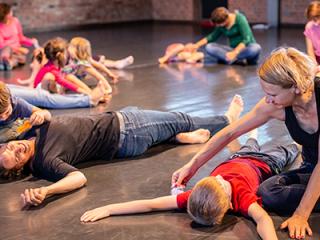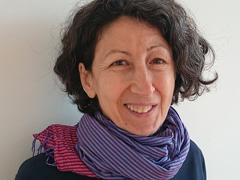
- Info event for C.A.R.E // Somatic childhood pedagogy
Q&A | DE+EN
To support babies, children and adolescents individually and competently in their developmental process according to their needs is the goal of the professionell training C.A.R.E // Somatic childhood pedagogy.
C.A.R.E stands for the following contents: Creativity- Attachment- Resilience- Education. Caring and Care work brings with it the responsibility to support the potential of each individual to unfold. In 200 units and 6 modules, the training conveys a comprehensive understanding of the importance of human movement development from embryological development to teenage years in practice and theory.
In movement we learn and develop. The first language we speak is non-verbal, is the language of movement. These non-verbal experiences form the basis for all further developmental processes.
Q&A C.A.R.E // Somatic childhood pedagogy
These evenings opens up the space for content-related and practical questions about the professional training and to get to know the teachers of C.A.R.E
Apr 20, 2024 // 6:00 - 7:30pm // in the Somatic Academy Berlin // DE+EN // with Adalisa Menghini
Please register via Mail
May 13, 2024 // 8:00 - 9:00pm // online // DE+EN // with Heike Kuhlmann
Please join via zoom link
Jun 05, 2024 // 7:30 - 8:30pm // online // DE+EN // with Ka Rustler
Please join via zoom link
Ausführliche Seminarinformationen
C.A.R.E. is a comprehensive training program that combines somatic movement practice with neuroscientific and pedagogical knowledge to promote holistic human development - whether in a therapeutic, educational or personal context.
The C.A.R.E. program is designed to train contact with ourselves and strengthen personal resilience so that a supportive field of relationships with others can become possible in the first place. Instead of reliving retraumatizing memories, C.A.R.E. helps participants understand the impact of the past on the nervous system and self-perception. With targeted work on early childhood reflexes, embryonic development and the foundations of self-regulation, dysfunctional survival strategies are recognized and new resources for stability and well-being are created. To achieve this, C.A.R.E. combines innovative somatic approaches with neuroscientific findings as well as attachment and developmental theories.
On the one hand, this program is about training the ability to support others in a resource- and relationship-oriented way, but also about dealing with one's own patterns. By observing and understanding the connections between movement and non-verbal interaction, C.A.R.E. enables participants to integrate these fundamental principles into their personal and professional practice.
C.A.R.E. stands for Creativity. Attachment. Resilience. Education and combines insights from Body-Mind Centering®, the Feldenkrais Method and neurophysiological psychology to explore, embody and communicate the relationship between our physiological developmental processes and emotions. This connection can enrich and transform your understanding, behavior and work with others.
What is the benefit of participation?
- Understand how our physiological and emotional systems are connected.
- Learn ways to strengthen your own emotional, mental and physical well-being.
- Gain insights into how you can help others - especially children and young people - to achieve greater body awareness and emotional regulation.
200 UE / 6 modules / 4 somatic methods / 3 instructors
This innovative training combines several somatic methods (IBMT; BMC®, INPP, Feldenkrais, Cranio-Sacral Osteopathy, Experiential Anatomy, Authentic Movement) with the latest theory and research on child development. A somatic approach can provide effective and simple support for babies, children and adolescents who are facing challenges in learning, development or emotional regulation, whether big or small. This programme will support you to integrate somatic approaches into your practice, providing a combination of body awareness and embodiment training with practical somatic exercises and approaches appropriate to specific client groups.
Who is this training suitable for?
The training offers a comprehensive professional development programme suitable for those working with babies, children and young people in a range of education and health care contexts. It is relevant to educators, social workers, midwives, doulas, physiotherapists , paediatric nurses, doctors , teachers, psychologists and no medical practitioners in the field of dance, music and theatre provision for children.
Training Goals
- Familiarity with the fundamentals of child development
- The ability to recognise the profound interconnections between the nonverbal and verbal dimensions of consciousness
- A somatic and theoretical understanding of the ongoing development and learning processes
- An understanding of the interpersonal emotional exchange of the development process and how to support it in relationship
- Knowledge of the psycho-physical processes of learning
- An understanding of Brain development
- The ability to recognise different developmental aspects of the different client groups
- The ability to integrate somatic approaches and methods into working with children
- An understanding of the Importance and fundamentals of communication with parents and carers
- Skills to recognise developmental and learning challenges within their client group.
Once qualified you will
- Be able to develop playful-somatic movement programs for different age groups, which support their development.
- Be familiar with"preverbal language” and able to playfully integrate childhood movement development and reflexes in a variety of contexts
- Be able to recognise and understand the presence of persistent primitive reflexes and be able to implement strategies to address this.
- Be able to recognise compensatory behaviours in your client group
- Be able to identify and develop support possibilities for development and learning difficulties / blockages
- Create an appreciative, appreciative and attentive atmosphere as a place of learning and playing
Curriculum
Module 1 | tba | Embryological basis of our life
|
Module 2 | Jan 31 - Feb 05, 2025 | Development of child´s movement
|
Module 3 | Apr 12-16, 2025 | Moving, playing, interacting with kids (0-3 years | 3-7 years)
|
Module 4 | Oct 27-31, 2025 | Movement and learning
|
Module 5 | Jan 31 - Feb 04, 2026 | Moving, playing, interacting with kids (8-12 years | 13-16 years)
|
Module 6 | Mar 30 - Apr 03, 2026 | Somatic working experience with kids and teenagers
|
Seminarleiter*innen

Adalisa Menghini
Teacher, choreographer, performer
Adalisa studied at the S.N.D.O in Amsterdam, after which she completed her M.A. in Neurophysiological Psychology. She is a teacher of the Feldenkrais Method. She works with professional and non-professional dancers, children and seniors. She was nominated twice as best choreographer of the "Giocabriga". In collaboration with K. Wickenhäuser, she has brought performances with school children to museums. Twice they have won the "Kinder zum Olymp!" award. She teaches at the Tanzfabrik, the Somatic Academy Berlin and at the Berlin University of the Arts.
Kosten
Anmeldeinformationen
BerlinSomatische Akademie Berlin
Paul-Lincke-Ufer 30
10999 Berlin | side building
1st backyard
4th floor
Q&A C.A.R.E // Somatic childhood pedagogy
These evenings opens up the space for content-related and practical questions about the professional training and to get to know the teachers of C.A.R.E // Somatic childhood pedagogy.
Apr 20, 2024 // 6:00 - 7:30pm // in the Somatic Academy Berlin // DE+EN // with Adalisa Menghini
Please register via Mail
May 13, 2024 // 8:00 - 9:00pm // online // DE+EN // with Heike Kuhlmann
Please join via zoom link
Jun 05, 2024 // 7:30 - 8:30pm // online // DE+EN // with Ka Rustler
Please join via zoom link
